Published on the 07/06/2018 | Written by Jonathan Cotton

It’s Silicon Valley’s favourite slide deck, but at a whopping 294 slides, Mary Meeker’s 2018 Trend Report is well and truly death by Powerpoint. But despair not: we’ve separated the wheat from the chaff on your behalf…
This year’s report, produced by Kleiner, Perkins, Caufield & Byers shows Amazon rapidly taking over the world, internal comm platforms radically improving efficiency and a bunch of other things.
Here’s what we’ve learned:
- Modern notions of privacy are weird
Internet companies are doing a great job at making low cost services better and they are doing this by leveraging user data. That’s a situation creating anxiety, something Meeker refers to as the ‘Privacy Paradox’.
“Internet companies are making low-price services better in part from user data,” says Meeker. “Internet users are increasing their time on internet services based on perceived value. Regulators want to ensure data is not used improperly, and not all regulators think about this in the same way.”
“Tech-driven trends are changing so rapidly that it’s rare when one side fully understands the other.”
There is an new cognisance of data’s value, which is encouraging regulatory scrutiny to make sure data is not used ‘improperly’. But just what ‘proper use’ of such data actually is, is far from clear, and regulatory bodies are just figuring this stuff out along with the rest of us.
“When you have rising monetization, rising growth and rising data collection, it drives a lot of regulatory scrutiny whether it’s related to data privacy, competition or safety in content. For the internet companies, it’s key to understand all this stuff and it’s very complex. We’re in the mid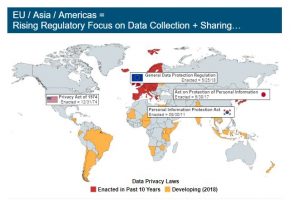 dle of it all right now and will be for a long time to come.”
dle of it all right now and will be for a long time to come.”
“Scrutiny is rising on all sides – users / businesses / regulators. Technology-driven trends are changing so rapidly that it’s rare when one side fully understands the other…setting the stage for reactions that can have unintended consequences. And, not all countries and actors look at the issues through the same lens.”
And it’s only going to get bigger/better/worse: Growing from 12 zetabytes in 2015 to a projected 47 zetabytes in 2020 (and 163 zetabytes in 2025) the gathering (and sharing) of data is increasing at, to borrow Meeker’s phrase, “a torrid pace”.
- Amazon has seized the internet (or the commerce side of it, at least)
With a market value of US$783 billion and more than half a million employees Amazon owns the eComm side of the web.
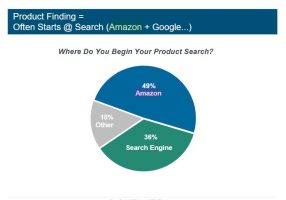 And here’s an interesting stat: A staggering 49 percent of all product searches start at Amazon, beating out even search engines as a generalised category(36 percent).
And here’s an interesting stat: A staggering 49 percent of all product searches start at Amazon, beating out even search engines as a generalised category(36 percent).
“Search leads on the internet, most people start a search at either Amazon or a search engine like Google,” says Meeker. “With product-finding at Amazon, it started in search fulfilled by Amazon. Product-finding at Google started at search fulfilled by others. Discovery is emerging as a way to find products, especially on places like Facebook. Instagram started at personalized discovery in the feed and it’s getting more data-driven personalized and a lot more competitive.”
While giants like Google started life as an ad platforms and have steadily moved into a commerce platform, Amazon – via its sponsored product feature – is, counter-intuitively, moving in the opposite direction, from general-commerce-platform to a paid-ad-placement platform, and it’s doing it to the tune of $4 billion (plus a 42 percent year on year increase) in ad revenue.
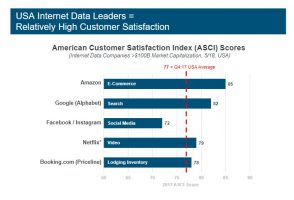 “If we look at e-commerce-related advertising revenue on Google, Amazon and Facebook, it is significant: Four billion on Amazon in the last year. Facebook has more than 80 million small- to medium-sized businesses on its site, 23 percent year to year on its service endeavoring to reach out to customers.”
“If we look at e-commerce-related advertising revenue on Google, Amazon and Facebook, it is significant: Four billion on Amazon in the last year. Facebook has more than 80 million small- to medium-sized businesses on its site, 23 percent year to year on its service endeavoring to reach out to customers.”
And about that data we mentioned? The research finds that Amazon’s data-hungry platform correlates – as with many others – to high levels of customer satisfaction (Amazon leads here again).
And the next big fight? Amazon verses Alibaba, as Albab looks to extend its reach beyond China.
- Subscription services are where it’s at
Lead by Netflix (with 118m subscribers) subscription fever has gripped the planet. (The other big leader is Spotify with 71 million subscribers and 48 percent year on year growth rate).
D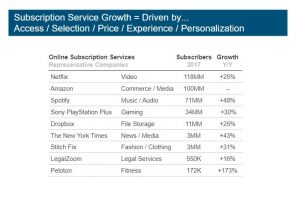 riven by access selection, price, experience and personalisation, “in e-commerce, many are evolving from buying to subscribing,” says Meeker.
riven by access selection, price, experience and personalisation, “in e-commerce, many are evolving from buying to subscribing,” says Meeker.
“One of the best examples of a company in this area is Spotify, which has 45 percent of its monthly active users are subscribers versus zero percent when they launched the subscription product 10 years ago. That’s primarily been driven by a really great user experience.”
“The key thing that people are focused on in this area is customer lifetime value. The importance is rising as customer acquisition costs increase. Lifetime value divided by customer acquisition costs is increasingly an important metric for retailers and brands.”
- Looking to improve productivity? Messaging FTW
You’ve heard it before: Consumerisation is changing what employees expect from their tools. What Snapchat is to millenials, Slack (and Dropbox, Zoom and Intercom) is to enterprise.
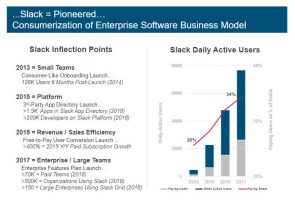 Well, now the research is in and, yes, enterprise messaging threads do in fact improve collaboration and increase productivity.
Well, now the research is in and, yes, enterprise messaging threads do in fact improve collaboration and increase productivity.
Slack specifically, when used in a business context, results in:
- 32 percent decline in email usage
- 24 percent reduction in employee onboarding time
- 23 percent faster time to market for development teams
- 23 percent decline in scheduled meetings
- 10 percent rise in employee satisfaction
Still haven’t had enough? Punishment gluttons can download the whole shebang in PDF form here: Mary Meeker’s 2018 Internet Trend Report.



























